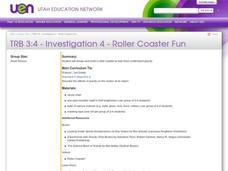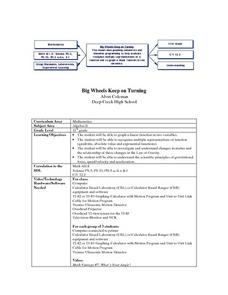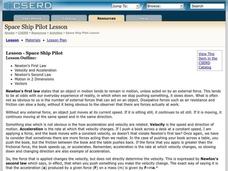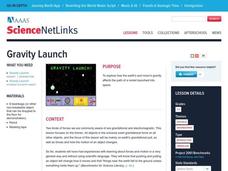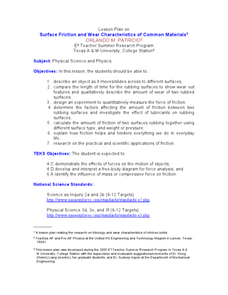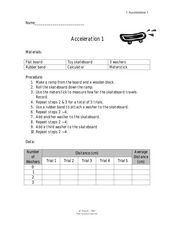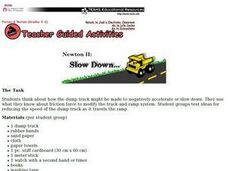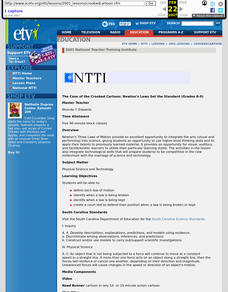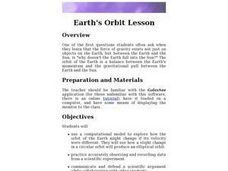Curated OER
Roller Coaster Fun
Third graders review the effects of gravity on how objects move. In groups, they design a roller coaster and share it with their classmates. Using materials given to them, they build their roller coaster and let a ball roll on the...
Curated OER
The Physics of the Planets: How 16th and 17th Century Physicist Helped Us Understand Our Solar System
Eighth graders draw the paths of the planets in the solar system. In this astronomy lesson, 8th graders calculate speed of objects using distance and time information. They research about the work of scientists in the 16th and 17th century.
Curated OER
Big Wheels Keep on Turning
Eleventh graders work in groups and investigate how force determines the speed and distance then they view the video, "Math Vantage #7: What's Your Angle?." They are given a real life problem to solve using speed, ramps, angle, incline...
Curated OER
Space Ship Pilot
Young scholars visualize the relation between acceleration and velocity in 2 dimensions. They are introduced to Newton's first law,and Newton's second law. Students work on an exploration activity where they condsider an example of a...
Curated OER
Avalanche!
Students explain that when forces on an object are balanced, the motion of object does not change. They describe how an object changes its motion when forces on it are unbalanced. They plan and conduct a scientific investigation to test...
Curated OER
Aircraft Trajectory Problem Set
Students, after reading an explanation from a NASA Web-based textbook, demonstrate an understanding of the text by applying it to the calculation of speed, distance, acceleration, and time in simple aircraft motion.
Curated OER
Gravity Launch
Students examine how gravity affects launching rockets into space. In this physical science instructional activity, students review the concept of gravity and use an interactive online site, "Gravity Launch," to simulate a rocket launch.
Curated OER
Simple Machines V - Wheels and Axles and Gears
Fourth graders investigate the principles and uses of gears, and examine how gears can be used to alter the direction of motion or the speed of an object. They observe two cars with different sized wheels roll down an inclined plane,...
Curated OER
Testing and Refining Aircraft Design
Young scholars design and make a flying device. They work in small groups to brainstorm ideas for the design of their device. They choose an idea or combination of ideas to use for their design and create a sketch of their design. The...
Curated OER
Building a Roller Coaster
Students describe the law of conservation of energy. They identify the conversion between potential and kinetic energy. They investigate and describe the application of Newton's Laws of Motion.
Curated OER
Simple Machines
Fourth graders discover the principles and uses of gears noting that they can be used to change the direction of motion or the speed of an object. They may also change the force and/or distance through which an object turns. They then...
Curated OER
Surface Friction and Wear Characteristics of Common Materials
High schoolers identify the factors affecting friction. In this physics lesson, students construct their own rocket car and race them. They graph the average speeds and discuss how lubricants affect friction between rubbing surfaces.
Curated OER
Rocket Angles
Eighth graders create rockets that be launched at varying angles to determine which angle is best to launch at for the longest distance.
Curated OER
Acceleration 1
In this acceleration worksheet, students use weights to increase the mass affecting the force on moving objects. Students plot a graph of their data and answer 3 questions about how the acceleration of the toy skateboard used in the...
Curated OER
Newton II; Slow Down
Young scholars, in hands-on activities, explore how a dump truck might be made to negatively accelerate or slow down. They participate in activities using friction force to modify the truck-and-ramp system. Student groups test ideas for...
Curated OER
Looking For Newton
The lesson has sufficient background information for the teacher to implement the lesson. Students are asked to summarize the three laws of motion. They also conduct classroom activities to role play the Laws of Newton.
Curated OER
Numerical Determination of Drag Coefficients
Learners create a video of an object falling with a drag. In this physics instructional activity, students calculate drag coefficient using data from Logger Pro. They calculate velocity and acceleration of the object.
Discovery Education
Jets in Flight
This Discovery Education activity provides the information needed to understand the basics of flight. Before taking off, young pilots learn the eight stages of the engineering design process. Small groups then design and build...
Curated OER
Impulse/Momentum Lab
Students investigate the relationship between force and momentum using motion detectors and sensors. In this physics lesson, students graph experimental results. They calculate impulse using the area under the graph.
Curated OER
Race the Track! Jump the Gap
Students record data of using a track system with variables and how those variables affect a ball used in the track. In this track lesson plan, students design their own track in groups, test the ball's rates of speed, and record their...
Curated OER
Simple Machines make work easier.
Students examine how simple machine work can make work easier. In this machines lesson students complete an activity that shows them what makes up a machine, and how to measure displacement and velocity.
Curated OER
The Case of the Crooked Cartoon: Newton's Laws Set the Standard
Students have the opportunity to use higher-level thinking skills and to apply their talents to previously learned material. It provides an opportunity for visual, auditory, and tactile/kinetic learners to utilize their particular...
Curated OER
Earth's Orbit Lesson
Tenth graders devise a computational model to explore how the orbit of the Earth might change if its velocity were different. Using accurately recorded data, 10th graders defend a scientific argument.
Curated OER
Fantastic Friction!!!
Learners work in small groups to list at least 10 items that have movement or motion choosing one item from the list to use as a topic for the following questions: How does this item move? How can we slow down the movement? How can we...
